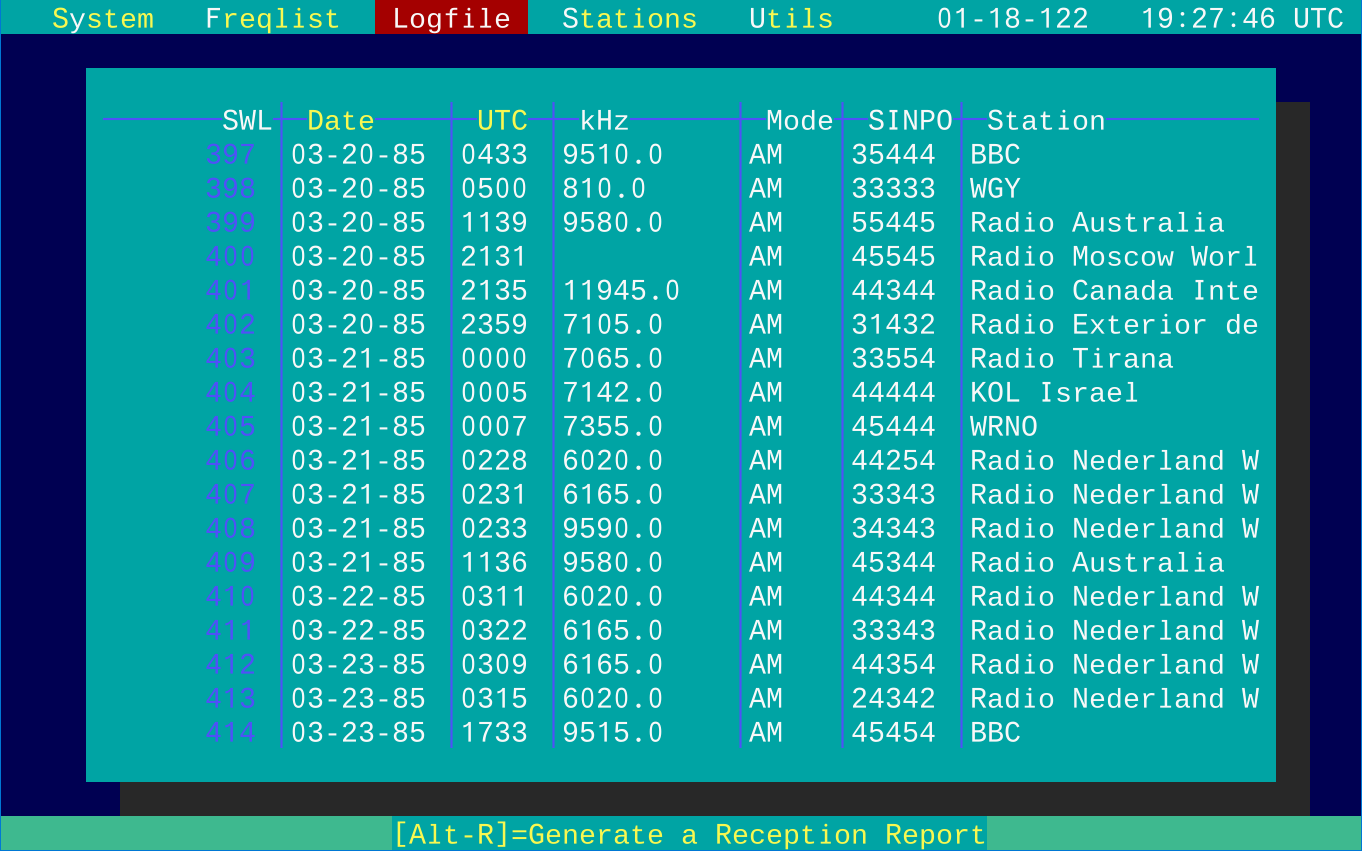Orlando Hamcation
Stop by Booth #014 in the main building at Orlando Hamcation from February 13th to 15th.
Logging
SWLog is a suite of products that provides logging, radio control, GPS synchronization, QSL management, reporting, and propagation prediction. This is all wrapped in a modern, easy-to-use interface that is designed to look like a modern application and not like a spreadsheet from 20 years ago. SWLog is designed to be used by shortwave listeners, broadcast radio enthusiasts, utility listeners, and amateur radio operators. SWLog is designed to be used by both casual and serious users.
Program schedules from HFCC, ILGRadio, AOKI, ADDX, SWSkeds, EiBi, and others are leveraged for broadcast reception. Call sign lookups and remote logbooks are integrated with ClubLog, eQSL, QRZ, Ham365, HamQTH, and LoTW.
Radio Control
Radio Control is supported for a variety of radios like Flex, Icom, Yaesu, and Kenwood. In addition to traditional radios, support for interfaces such as FLRig, OmniRig, and HamLib is also provided.
Mobile Apps
SWLog provides Android and iOS applications for logging on the go as well as web servers for logging and remote control from anywhere. The apps seamlessly transfer logs without the tedium of ADIF export/copy/import.
Logging since 1988
SWLog has been continuously improved and expanded since it was first released 38 years ago. SWLog started as an MS-DOS application and has been continuously improved and expanded since then.
Click on each tab below for detailed information about the topic.
Download
Build 9466 - Released November 30, 2025
windows-amd64
All desktop (i.e. non-mobile) applications within the SWLog suite run on Windows. This is for full installations and upgrades.
Targeted for AMD- and Intel-based systems running Windows 11 or Windows 10. The installation package will optionally download and install SQL Server Express 2022. Backwards-compatible with SQL Server 2017 or 2019.
windows-arm64
All desktop (i.e. non-mobile) applications within the SWLog suite run on Windows. This is for full installations and upgrades.
Targeted for ARM64 Snapdragon-based systems running Windows 11.
Android
A mobile logging application for shortwave/broadcast and amateur logs.
Targeted for Android 13 and higher. Designed for the Samsung Galaxy, Google Pixel, and other Android phones that have the current version of Android. Download from the Google Play store.
Apple iOS
A mobile logging application for shortwave/broadcast and amateur logs.
Targeted for iOS 16.4 and higher. Designed for the iPhone. Download from the Apple App store.
Licensing
SWLog is available in two editions: Standard and Plus. The Standard Edition has no cost; the Plus Edition is licensed on a per-year basis and includes additional features. A 60-day free trial of the Plus Edition is enabled for all new users. Please take advantage of the trial to determine of SWLog suits your needs. The program will revert to the Standard Edition at the end of the trial.
While priced in US Dollars, the payment processor will dynamically convert to other currencies.
One Year Plan
Plus Edition
Broadcast & Utility Only
$19 / year
- Contains features for broadcast & utility logging.
- There are no functions for amateur radio.
- This is standalone; getting amateur radio functions would require a new license.
One Year Plan
Plus Edition
$33 ⅓ / year
- All Features
Two Year Plan
Plus Edition
$60 / 2 years
- All Features
- 10% discount over the one year plan
Standard & Plus Edition Comparison
The Standard edition is available at no cost. The Plus edition includes many expanded features and is licensed on an annual or biennial basis. New installations will receive a 60-day free trial of the Plus edition. At the end of the trial, either a license key can be obtained or the program will revert to the Standard edition.
| Feature | Standard Edition | Plus Edition |
|---|---|---|
| Cost | No Cost | Annual or Biennial License |
| AI Assistant | ||
| Amateur Radio Data Entry Modes | Traditional & Mobile | Traditional, Nimble, NLE, & Mobile |
| Amateur Radio QSO Integration | ClubLog, HamQTH | ClubLog, Ham365, HamQTH, LoTW, POTA, QRZ, QRZCQ |
| Amateur Radio QSL Card Integration | SWLog, paper (scanned) | Email (ad hoc messages), eQSL, Ham365, SWLog, and paper (scanned) |
| API Integration | Partial | Full |
| Data Import / Export | ||
| DX Cluster Monitoring | ||
| GPS Time Sync | ||
| Map Providers | Open Street | ArcGIS, Bing, Open Cycle, Open Sea, Open Street, plus User-defined Custom maps (e.g. GeoMapifier, MapTiler, Stadia) |
| Mobile Data Export | Integrated | Integrated & ADIF |
| Mobile DX Cluster | ||
| Multi-Lingual QSL Writer for Shortwave, Broadcast, & Utility logs | ||
| Propagation Calculation | MicroMUF-84 | MicroMUF-84 and VOACAP |
| POTA Monitoring | ||
| Propagation Prediction | ||
| Radio Control Interfaces | Icom CIV, Kenwood, Lowe, Yaesu | ATS-Mini, CATSync, Flex, FLRig, HamLib (serial and TCP), Icom CIV, Icom PCR, Kenwood, Lowe, OmniRig, SDR#, SDR-Console, WiNRADiO XRS, Yaesu |
| Reports & Analytics | Traditional; date range limited to the past year | Traditional, Heat Maps, and Maps |
| Shortwave & Broadcast Schedules | ACMA, FCC AM, FCC FM, FCC HF, HFCC, Mesa Mike's AM | ACMA, ADDX, AKOI, ClassAxe, DRM, EiBi, European Medium Wave, FCC AM, FCC FM, FCC HF, HFCC, ILGRadio, Mesa Mike's AM, OFcom, SWSkeds |
| Shortwave Community | ||
| Web Based Logging and Radio Control | ||
| WSJT-X & JTDX UDP Network Integration and Monitoring |
Frequently Asked Questions
SWLog started back in 1988 and was solely focused on shortwave logs. In the late 1980s, shortwave transmissions were the primary source of news and features from an overseas perspective. The big names in broadcasting such as the BBC, Radio Netherlands, Deutsche Welle, Radio Moscow, Radio RSA, Radio Australia, HCJB, Swiss Radio International, and many more broadcast daily to North America.
In 1988 SWLog was (obviously) a program written for MS-DOS. For the classic computer aficionados, SWLog version 1.00 was coded under MS-DOS 3.30 on a Tandy 1000 SX first with Borland Turbo C then with Microsoft C 6.0A. The logs were stored with the Paradox database engine. While the original version does still technically run, the code to import the data from Paradox has long been sunsetted. So any logs would be effectively orphaned. For retro-PC enthusiasts, version 1.21 of the MS-DOS program can be downloaded. It can be run under DOSBox and DOSBox-X, so a traditional MS-DOS virtual machine is not strictly necessary.

SWLog was originally distributed on BBS systems and the well-known Simtel MS-DOS Archive, which was the primary method of distribution as CD-ROMs of the Simtel archive were widely available at computer fairs in the early 1990s. By 2004 the web site was created and SWLog started to be distributed as a download, although users could still obtain a CD-ROM version if necessary.
As the years progressed, the scope and features expanded and the underlying technology has changed. A dedicated section for logging amateur radio QSOs was added in the early 2000s. SWLog is today a suite of programs providing not only logging but radio control and extensive reporting.
SWLog just looks and operates differently from other logging programs that look and act like Excel for Windows 95. SWLog eschews the 1990s aesthetic that is so typical of radio-related programs.
Secondly, SWLog is built upon modern technologies. While SWLog has been in development since 1988, it has continually stayed modern and has thus avoided becoming legacy software that is so aged that it must be discarded and rewritten. SWLog is designed to be flexible from a single notebook computer to a home lab setup to cloud-based.
And do not forget the maps! SWLog is admittedly a bit map crazy!
The data that is collected and how it is collected simply differs between broadcast and amateur logs. For example, a shortwave or AM/FM log would use frequency databases like ILGRadio, HFCC, or FCC AM/FM Engineering. Amateur radio logs use data from QRZ, the FCC, HamQTH, ClubLog, etc. However, the underlying structure for both types of logs is unified in the database.
Or think of it as like the McDonald's McDLT - the hot stays hot and the cold stays cool!
Bundled with the installer is a PDF that can be printed old-school style like the old Word Perfect manuals from the 1980s! Based upon feedback, the once beefy documentation has been reduced and streamlined to contain just the essentials.
After the Plus Edition expires, the program will continue to function all the features of the Standard Edition. No logs are ever affected. The program will continue to function as it did before the Plus Edition was enabled.
SWLog is proudly coded entirely in the United States America in the State of Florida.


Support can be found on the groups.io forum. Priority is given to licensed users.
SWLog was just SWLog when it started in 1988 as application names were limited to eight characters. The full name of the application has always been Shortwave Log. As more and more Amateur-related features were added through the 1990s, the full name was expanded to Shortwave & Amateur Radio Log. Think of SWLog as the nickname.
SWLog has between 500,000 and 600,000 lines of native code. The main programming languages are C#, C++, SQL, and JavaScript with a smattering of PowerShell for the CI/CD process.
Many parts of the program have code that were written in the 1980s and 1990s have been updated to modern standards. Examples are the multi-lingual QSL writer, propagation prediction, the add and browse features for the shortwave/broadcast/utility logs, the code behind the What's Playing Now (WPN) feature, the DX Club reports, the import routines for ILGRadio and HFCC, and the sunrise/sunset calculations. The code for these functions were written during the 1988 to 1992 time frame.
